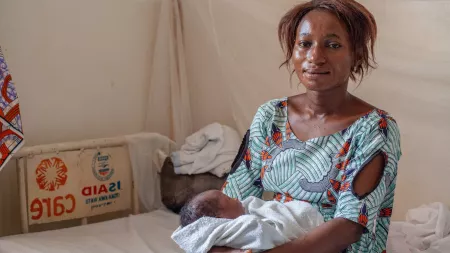Goma, 14 November - Conflicts in the Democratic Republic of Congo (DRC) are completely deteriorating the healthcare system in the country, risking the well-being of nearly 9 million people. Women and children have suffered the most, especially in remote and conflict-ridden areas, with increasingly limited access to essential and life-saving medical services.
Eastern DRC has become one of the most dangerous places in the world for women and children,said Sidibe Kadidia, CARE International DRC Country Director.
"Maternal and child health remains a critical issue in the DRC. Access to proper maternal healthcare services, including skilled birth attendants and necessary facilities, is still a challenge in many regions, leading to high maternal and infant mortality rates. Additionally, as primary caregivers, women are more susceptible to contracting diseases and fall ill when taking care of family members”, added Kadidia.
Sexual assault survivors face double trauma
Access to sexual health services is also rapidly declining, which is particularly concerning for a country with an alarmingly high incidence of sexual and gender-based violence (SGBV). Reports indicate that in the DRC 52% of women will face SGBV in their lifetime and 39% of girls will be married before turning 18. In Goma alone, over 70 SGBV-affected women are attended to daily at clinics; since the beginning of the year over 35,000 cases have been reported.
The crumbling health system added to the stigma of SGBV makes millions of these women suffer in silence or not receive adequate care. The lack of proper medical and psychological support doubles the trauma for survivors.
The conflicts in the DRC have compounded the strain on a healthcare system already overloaded by successive epidemics, including 15 Ebola outbreaks, malaria, cholera, bubonic plague, yellow fever, and measles. Clinics currently lack proper equipment for almost any service, including primary healthcare.
“A concerted effort by all is needed to support the distressed communities. On one hand, international donors and supporters need to bolster the Humanitarian Response plan which at present is short 63.5% of what is needed. On the other hand, there needs to be a cessation of hostilities to adequately deliver amongst other services, health and nutrition support to those who need it. The opportunity to save lives is now. Let us not wait until it is too late to support those in need,” said Sidibe Kadidia.
For media inquiries, please contact Iolanda Jaquemet, Senior Humanitarian Communications Coordinator, CARE International via: [email protected].
